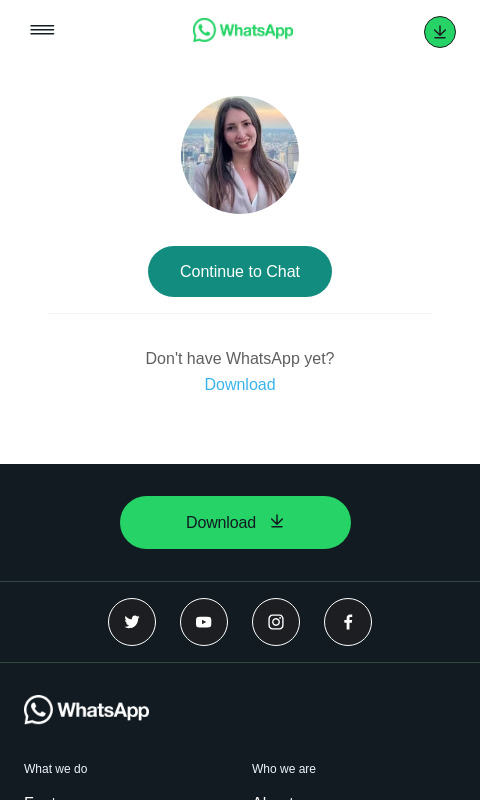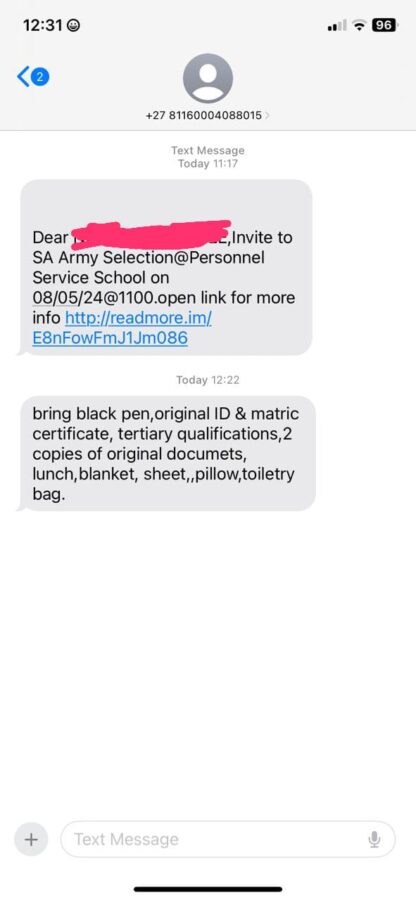“You have been selected to work full-time or part-time with a daily salary of 5000 ZAR,” reads an SMS job offer sent to my phone. If you want to accept this proposal, you’ll have to follow a link that has been attached.
The link in question sends you to a WhatsApp chat with a nameless account. This is a scam, one that we have seen before with scammers chatting up users on WhatsApp, and luring them in with promises of work opportunities.

As we saw last month, what often happens with these SMS or WhatsApp scams, is that eventually you will be asked to pay some money, like R1 000, to access “premium tasks.” Jobs that can net you more earnings. These premium tasks will never come and you will now be left with less money, and no job for your trouble.
I got a job offer via SMS, is it authentic?
Another similar type of SMS job scam is one that masquerades as a known government institution or large company. A notable one that we came across is from scammers purporting to be the South African National Defence Force (SANDF).

This one starts like the one above – a call to action, an SMS job offer, and a link to be clicked. But, unlike the quick and easy WhatsApp scam above, the scammers in this one went further to make it look more authentic, by adding a series of required items.
The link in this one also leads to a fully created website that seeks to mislead people into thinking it is the actual SANDF. Opening the link will take you to a page that claims to be the official “SA Army Headquarters (MSDS).”

“MSDS” stands for the Military Skills Development System, which is the real wing of the SANDF that trains soldiers and officers, and gives them access to a career in the military.
However, there are clear red flags with this one. The first is the poor spelling and grammar in the SMS itself. An official communication from a government entity will not contain spelling mistakes or grammar issues, especially with punctuation marks.
The second is that the “SA Army Headquarters” is not used by the SANDF as an official name for itself or its wings, and instead, it is the Department of Defence that oversees the military of the country.
The third red flag is the “Powered by BulkSMS” watermark at the bottom of the page. Surely, the South African government can afford in-house software to send messages en masse?
It is likely that the webpage is either stealing user information, or leads to further communication with scammers, who will also likely solicit money or worse, send you to a location where you will be physically robbed.
What to look out for:
Thanks to South Africa’s vast portion of unemployed individuals, scammers are now targeting those desperate for jobs through our phones. This method is working well for them because it seems to be growing in terms of how commonly these scams land in our inboxes.
If you received an unsolicited job offer via SMS, it is 99.9 percent likely that it is a scam. This is not how professional companies or the government seek employees. The government finds its employees via job adverts on its official websites, which one must follow a series of steps to sign up for.
Companies will post career positions on their official web pages or through trusted partners like LinkedIn or others.
Of course, all other red flags apply, such as bad spelling/grammar, weird links that don’t have a clear destination, or long phone numbers that you don’t recognise. Many smartphones are now blocking these scams thanks to the fact that many use the same principles to avoid detection.
Be wary about wonderful offers that seem to good to be true. They usually are. And never pay anyone online on just a text promise.
[Image – Photo by Alex Nemo Hanse on Unsplash]

